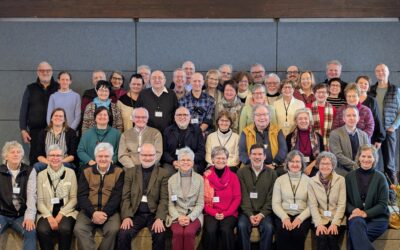Schönstatt leaders from various European countries visited the Focolare’s international headquarters at Rocca di Papa near Rome on 20 November.  On Wednesday 20 November, leaders from the Schönstatt Movement from Austria, Czech Republic, Germany, Great Britain, Italy, Spain and Switzerland visited the Focolare’s international headquarters at Rocca di Papa. The group included Fr. Heinrich Walter, former president of the General Presidium of Schönstatt. One of the goals of the visit was “meeting Chiara” by visiting her house and praying at her tomb. A second objective for the leaders of Schönstatt was to open a dialogue with Focolare about the social and political changes in Europe, the role of the Movement with their charism, and the significance of the communion between them, especially Together for Europe – in the context of ecclesial, political and cultural transformation. The delegation was welcomed to the Focolare’s centre by Co-president Jesús Morán and a number of its councillors. In order to put the charisms at the service of the good of the continent, it quickly emerged in the dialogue that there was a need to carry out cultural projects that were the product of each organisation’s talents, as well as the communion between each of them. The meeting and the dialogue were also made up of less formal activities, which were valuable and productive. This was obviously just a single step on what has become a long journey or communion and collaboration between Schönstatt and Focolare, which began at St. Peter’s Square in Rome on the vigil of Pentecost 1998. Beyond that, for 20 years by now, ever since the beginning Schönstatt has also been part of that network of movements and communities that make up Together for Europe. Fr. Heinrich Walter is an effective member of the committee directing it. Close relationships, characterised by unity between Christians of various churches and confessions, have grown between Focolare and Schönstatt these years, as well as beyond it. It is a unity that requires deep, true reconciliation, which is considered a direct gateway to unity while maintaining the necessary diversity that enriches and completes each other. The Schönstatt Movement was founded by Fr. Josef Kentenich in 1914 at Schönstatt, near Koblenz in Germany, and has an educational charism.
On Wednesday 20 November, leaders from the Schönstatt Movement from Austria, Czech Republic, Germany, Great Britain, Italy, Spain and Switzerland visited the Focolare’s international headquarters at Rocca di Papa. The group included Fr. Heinrich Walter, former president of the General Presidium of Schönstatt. One of the goals of the visit was “meeting Chiara” by visiting her house and praying at her tomb. A second objective for the leaders of Schönstatt was to open a dialogue with Focolare about the social and political changes in Europe, the role of the Movement with their charism, and the significance of the communion between them, especially Together for Europe – in the context of ecclesial, political and cultural transformation. The delegation was welcomed to the Focolare’s centre by Co-president Jesús Morán and a number of its councillors. In order to put the charisms at the service of the good of the continent, it quickly emerged in the dialogue that there was a need to carry out cultural projects that were the product of each organisation’s talents, as well as the communion between each of them. The meeting and the dialogue were also made up of less formal activities, which were valuable and productive. This was obviously just a single step on what has become a long journey or communion and collaboration between Schönstatt and Focolare, which began at St. Peter’s Square in Rome on the vigil of Pentecost 1998. Beyond that, for 20 years by now, ever since the beginning Schönstatt has also been part of that network of movements and communities that make up Together for Europe. Fr. Heinrich Walter is an effective member of the committee directing it. Close relationships, characterised by unity between Christians of various churches and confessions, have grown between Focolare and Schönstatt these years, as well as beyond it. It is a unity that requires deep, true reconciliation, which is considered a direct gateway to unity while maintaining the necessary diversity that enriches and completes each other. The Schönstatt Movement was founded by Fr. Josef Kentenich in 1914 at Schönstatt, near Koblenz in Germany, and has an educational charism.
Severin Schmid




0 Comments